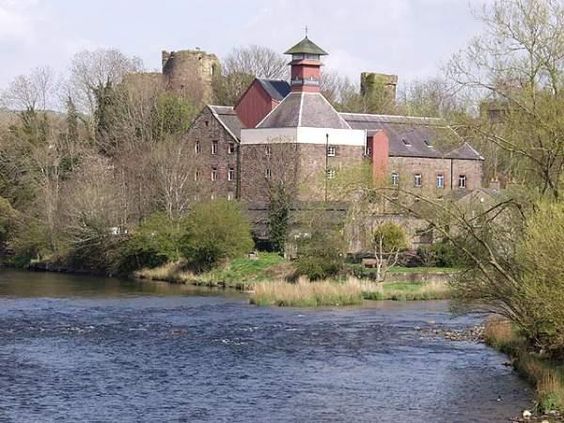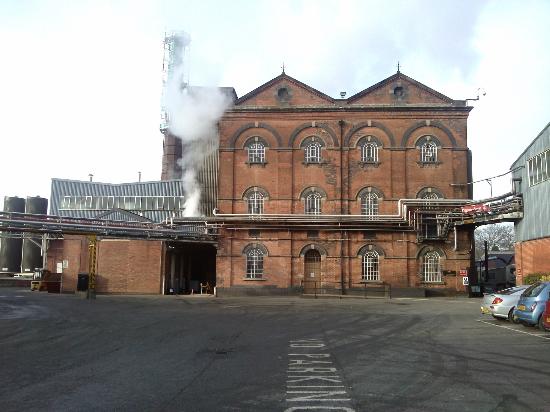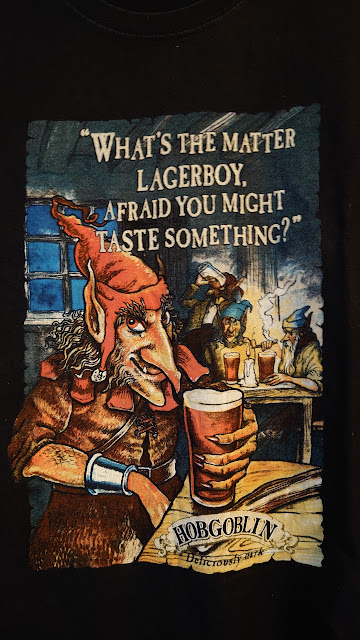Another brewery is due to close its doors, but this one is not some recent start-up brewing craft beer where the owners have called time. No, this is a well-established brewery which is being closed by its parent company due to market challenges in the name of consolidation....
News broke last week that Carlsberg Marstons Brewing Company (CMBC) were planning to close the historic Eagle Maltings in Witney, Oxfordshire, which has been producing beer since 1841, and which has been the home of Wychwood Brewery since 1990. The brewery has also been producing beers for the displaced Oxfordshire brewers, Brakspear, since 2002 when they were both owned by a company called Refresh, who were subsequently taken over by Marstons. Wychwood are famous for their Hobgoblin beers, which at one time used the memorable strapline to promote their original 4.5% dark ruby version "What's the matter, Lager Boy, afraid you might taste something?" as shown above on an old tee shirt that I found recently at the back of my wardrobe. This drew on imagery of local myths and legends in their part of Oxfordshire and proved to be a highly effective marketing campaign which they built on over a number of years as they expanded their range of beers. Brakspears, meanwhile, go back far longer in history, having started brewing in 1779 at their original site in Henley-on-Thames, and can count in their family ancestors the only Englishman ever to hold the position of Pope.
Paul Davies, CEO, Carlsberg Marston’s Brewing Company, said: “We understand the depth of feeling towards Wychwood Brewery, and have tremendous pride in our team there. Our number one focus is giving them all the support they need as we begin the consultation on this proposal.
“The UK ale market is an incredibly competitive space, and combined with a turbulent economic outlook for the UK provides for a challenging environment for industry to navigate.
"By making use of the break clause in our lease for Wychwood Brewery, we can consolidate our brewing network to achieve greater efficiency and productivity, supporting ongoing investment in our people and business.”
But there was almost an inevitability about these developments. Earlier this year, CMBC had announced that they were selling off the Ringwood Brewery in Hampshire, citing lack of room for expansion in what is a predominantly residential area. And not too long before that, they had caused consternation in Cumbria and beyond when they closed the historic Jennings' brewery in Cockermouth, where the company had been based since 1887.
 |
| The former Jennings Brewery, Cockermouth, Cumbria |
Back when I started drinking in the 1970's, Marstons was held up as the epitome of a fine principled independent, regional brewery, some of whose pubs such as the Red Lion in Withington I'd come across during my student days in Manchester. The company had a number of notable beers, including Pedigree, a 4.3% bitter which was brewed using the Burton Union system of recirculating fermentation, Merrie Monk, a strong mild with the same strength as Pedigree that was at the time the strongest mild in the country, and Owd Rodger, an 8% sweet and rich barley wine. Against a background of the manoeuvrings of the so-called Big Six national breweries - Watney Mann, Whitbread, Allied Breweries, Scottish & Newcastle, Courage, and Bass Charrington - Marstons, a brewery with over a thousand pubs itself, was the benign face of brewing. But it had in the early years of the 20th century been highly acquisitive by nature having taken over breweries in places such as Appleby in Westmoreland, Winchester, and Shropshire, before taking over the Border Brewery in Wrexham in the 1980's. But not withstanding its decent reputation in the early days of CAMRA, Marstons had fallen under the Whitbread umbrella, a system whereby the large national brewer would buy a stake in a company thereby providing protection against any predatory moves by any of the other Big Six in return for distribution of their lager or other drinks. This kind of relationship was fine to a degree, until Whitbread decided to up their stake, take control, and ultimately close the brewery, eg. Kirkstall, Strongs, Fremlins, and Duttons.
 |
| Marstons Brewery, Burton-on-Trent |
The Big Six are long gone now of course, having been banished by the Beer Orders Act, with Whitbread never managing to take a controlling interest in Marstons. Meanwhile, the change in the brewing landscape and the switch to pubcos like Enterprise and Punch Taverns, who owned large numbers of former Big Six pubs and were free to source their beers from wherever they wanted, meant that Marstons were now themselves amongst the biggest brewers in the country and they re-discovered their acquisitive nature with an eye on the changed environment. But then Wolverhampton and Dudley Breweries, the home of Banks and Holdens beers, a company with huge brewing capacity, bought them, along with Wychwood, Ringwood, and Jennings at different ends of the country. The Marstons name was quickly adopted for the new combined brewing giant. Agreements were made with the likes of Thwaites of Blackburn and Brains of Cardiff to brew their beers and/or run their pubs, whilst acquiring the rights to brew beers such as Tetleys.
Some of the beers have continued to be brewed once the original breweries have been closed down. Whilst they may well be using the original yeast strain, the impact of different water (despite efforts to match the original sources) and production in a different brewery without any of the indiosyncrasies embedded in the original site, and likely brewing more to a recipe than brewing with a local passion for your beer, it is almost inevitable that the taste will vary from the original. To the average drinker it may possibly taste better, to the original, regular drinkers of those beers they would most likely say they are pale imitations of their former selves. They have lost their provenance, that connection to their local area.
And in mentioning Tetleys, their former partners, Danish brewers, Carlsberg, joined the fray when they and Marstons announced a £780 million merger in 2020 in which Marstons have a 40% share with the breweries acquired by the new group. For both Carlsberg, who are a large international player focussing on lager, and Marstons with their portfolio of ales and large number of pubs in the UK, the merger made strategic sense. However, the influence of the Danes, whose gleaming, computerised breweries such as their UK base in Northampton are far removed from a creaking traditional site such as the old Jennings or Eagle breweries, began to take hold and as is inevitable in the wake of feasibility studies and return on investment analyses, the accountants hold the cards.
But this is the nature of business. When Carlsberg and Marstons got together, it wasn't to keep things as they were. It was to create synergies, ie. find mutually beneficial ways of saving money and creating efficiencies. And if an old traditional brewery or two are getting in the way of achieving that, well if they don't add value to the business then they are likely to be in some danger. When sentiment meets the bottom line, it is very rare that it triumphs.
And it is ever more important in the difficult market conditions we are seeing today, as the actions of CMBC have shown. Which makes it especially hard for those brewers and micro pub owners in particular who have followed their dreams of opening a brewery or a bar based on anything other than solid business principles. If you're just doing it because you love beer or like pubs, you are likely to come a cropper if you are not focussed on the what will no doubt seem to some to be the boring business stuff. And where customers are spending less due to financial pressures elsewhere, the market trends are shifting, and prices are going up, it makes it increasingly difficult to maintain the status quo. It is essential that the business is as nimble as possible, and responsive to changes in the marketplace and mindful of their customers needs, otherwise as we have seen with plenty of breweries, bars, and long-established pubs over the past couple of years they are likely to fail.
And to go back to Wychwood, the lager boys of CMBC have come out on top, and it provides a salient reminder that sadly the big guys will usually triumph, particularly in these challenging times....
Follow me on twitter/X: @realalemusic


Good read Chris. When did you last have a pint of Hobgoblin ? I rarely see it these days (last time before a gig in Oxford 4 years back), and I think it's time had passed.
ReplyDeleteCheers, Martin, not drunk it for ages myself, not my type of beer these days, but at one time I would have quite happily drunk it! Sign of the times.
DeleteNice to hear such evocative names as Ringwood, Duttons, Fremlins, and Wolverhampton & Dudley again. We've lost many, many good breweries - including our own big three in Fax, in Webster's, Ramsden's and Whittaker's. T'was always thus, sadly.
ReplyDeleteA good read Chris.
Thanks very much!
Delete